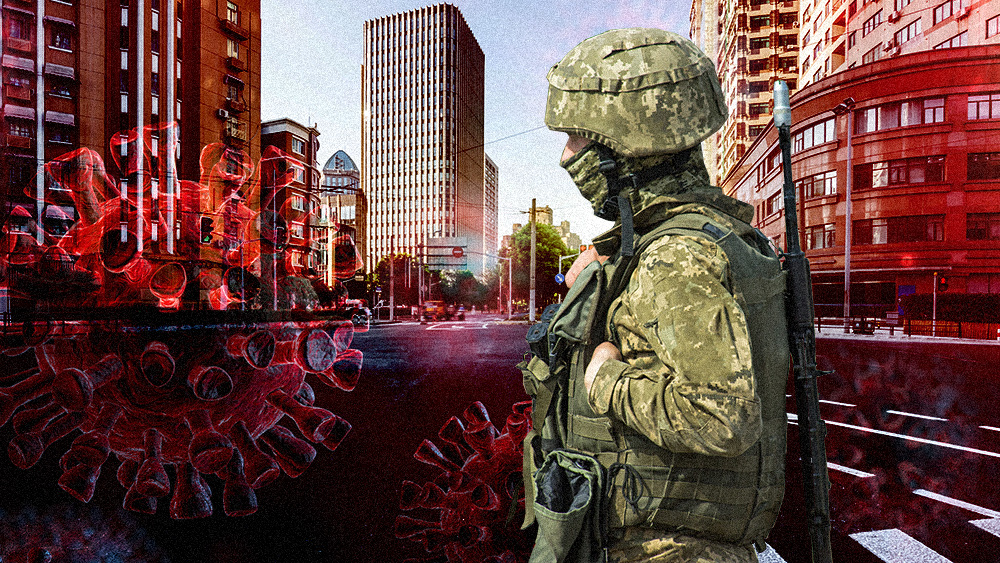The coronavirus is spreading through the U.S. Armed Forces
07/17/2020 / By Arsenio Toledo

According to the latest data released by the Department of Defense, over 4,000 American service men and women have tested positive for the Wuhan coronavirus (COVID-19) since the beginning of July. The rate at which cases in the armed forces have grown is about 60 percent, or more than double the national average.
The number of COVID-19 cases in the armed forces has increased by over 1,700 since July 15. The total number of cases the military has had to deal with sits at 18,016, including 7,462 recoveries. This puts the number of cases they are currently handling at 10,554. This number includes forces both in the United States and overseas, and does not include contractors, army civilians and military dependents.
Military civilians, dependents and contractors have had 7,806 cases of COVID-19, including 39 deaths and 3,211 recoveries. Fortunately, only three military service members have died from the coronavirus.
The military’s infection rate now stands at 0.8 percent, compared to 0.9 percent nationwide. This is the closest the armed forces’ infection rate has come to matching the rate of the general public.
Air Force spokeswoman Lt. Col. Malinda Singleton told the Military Times that they are attributing the surge in coronavirus cases in the military to increased testing, “which can lead to more positive cases, which prompts more testing” and to the fact that many military installations are situated in current COVID-19 hot spots. While the Pentagon has not provided the public with a base-by-base breakdown of its coronavirus cases, some journalists have reported that many of the new infections are primarily coming from military installations in Texas, Florida and California.
Military officials have expressed their faith that local commanders are doing everything they can to keep the virus away from their troops by practicing protective measures, such as wearing face coverings at all times and practicing social distancing.
However, these protective measures can only be enforced while the troops are in the bases. Many installations have lifted their shelter-in-place orders, which allows the troops to visit towns and cities situated close to the base, and the behavior of these service members outside of their camps has not been universally regulated with the exception of the Navy, who have banned their troops from going to a number of public places, such as restaurants, bars, beaches, swimming pools, tattoo shops, theaters, spas and salons.
Listen to this episode of the Health Ranger Report as Mike Adams, the Health Ranger, talks about how Americans will likely be unable to survive a second wave of coronavirus lockdowns.
U.S. forces in critical military bases are hit by coronavirus
As the coronavirus spreads through the armed forces, soldiers stationed at critical military bases overseas have not been exempt. This includes service members at military bases in Okinawa, Japan, where hundreds of new cases have been tallied since the beginning of July.
The coronavirus has forced several military bases in Okinawa to go under lockdown, including Marine Corps Air Station Futenma (MCAS Futenma), Camp Hansen and the vital Kadena Air Base, which calls itself the hub of American air power in the Pacific.
Air Force Brigadier General Joel Carey, commander of Kadena, said that the cases in these bases have primarily been from Marines stationed at MCAS Futenma and Camp Hansen. While the origin of the outbreak in these bases is still unclear, Carey believes it may partly be attributed to travel.
“It is extremely regrettable that at a time when residents in Okinawa make an all-out effort to prevent infections, a multitude of cases have occurred in a short span of time among U.S. military personnel,” said Okinawa Gov. Denny Tamaki at a news conference on Friday, July 10. “I cannot help but harbor a strong sense of distrust of steps taken by the U.S. military toward curbing infections.”
Japan has kept its borders closed due to the threat of the pandemic. However, their moratorium on international travelers does not cover military personnel under a 1960 agreement which grants members of the U.S. armed forces a special dispensation from Japanese laws and regulations regarding travel.
This means that many service members that are traveling to U.S. bases in Japan can bypass the mandatory virus testing the Japanese government is conducting at its major international airports by flying directly to military installations. This loophole, many have argued, can seriously undermine Japan’s effort to keep the virus out by shutting down its borders. (Related: Hokkaido lifted its state of emergency and lockdown TOO EARLY – and is now facing a SECOND WAVE of coronavirus infections.)
Other U.S. forces affected by the coronavirus include service members of U.S. Forces Korea (USFK), where nearly 100 troops have contracted the virus, and at U.S. marine Corps Air Station Iwakuni in Mainland Japan, where the “presence of COVID-19” has been confirmed by Japan’s Ministry of Foreign Affairs.
Find out more about how the coronavirus continues to spread internationally at Pandemic.news.
Sources include:
Submit a correction >>
Tagged Under:
air force, army, China, coronavirus, covid-19, Flu, government, infections, Japan, military, military bases, navy, Okinawa, outbreak, pandemic, South Korea, superbugs, US military, virus
This article may contain statements that reflect the opinion of the author
RECENT NEWS & ARTICLES
Infections.News is a fact-based public education website published by Infections News Features, LLC.
All content copyright © 2018 by Infections News Features, LLC.
Contact Us with Tips or Corrections
All trademarks, registered trademarks and servicemarks mentioned on this site are the property of their respective owners.





















